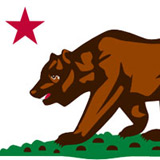Grand Old Pandemonium
In Search for Political Relevance, State Republicans Mostly Battle Each Other
Bob Naylor, who led the California Republican Party more than 20 years and many incarnations ago, watched the raucous proceedings of the just-completed state GOP convention with a stoic smile — and a great deal of head-shaking.
Standing on the floor of the Sacramento Convention Center early Sunday morning, Naylor offered a huge sigh when he was asked to describe the state of the current state GOP:
“It’s on life support,” he said.

The 67-year-old Naylor, a political moderate and a former longtime legislator, chaired the party in 1988, coincidentally the last time Republicans captured California in a presidential election. Yet his pragmatic, center-right brand of politics was widely bashed and belittled at the GOP convention, which turned into a weekend of internecine sniping and intra-party feuding, as right-wing party apparatchiks pushed a series of rules and resolutions crafted more for enforcing ideological purity than for helping Republicans actually win elections.
At a time when Republicans around the country have rebounded after being routed nationally in 2008, the California GOP in this bluest of states today is “on the brink of irrelevance,” as Republican fundraiser Jeff Miller told reporters at the convention. Potential political donors, he added, “think the party focuses most of its time speaking to 30 percent of the state rather than the majority of the state … [focuses] on eating our own, as opposed to focusing on electing more Republicans.”
As the GOP has sunk to their lowest voter registration level in state history, while Democrats hold 123 of the 187 partisan seats in California — 66 percent — activists and hardliners provided plenty of evidence over the weekend to support Miller’s pessimistic view:
• State Senator Sam Blakeslee, who represents part of Santa Barbara County and who is one of the few GOP legislators who’s been willing to negotiate with Governor Brown on the budget, stalked out of a convention committee hearing and accused right-wingers of “thuggery” for pushing a bylaw to effectively give the state party the political power to punish incumbents who deviate from right-wing orthodoxy by withholding the party label under the state’s new “open primary” system.
• The California Republican Assembly, the GOP’s most conservative faction, sponsored a measure to brand as “traitors” any party officeholder who backs Brown’s effort to call a special election to allow voters to decide whether to extend a set of tax increases to help balance the budget, a move aimed squarely at Blakeslee and four colleagues who have been in talks with the governor. Although the “traitor” language was eventually withdrawn, delegates nonetheless passed a resolution insisting that Republican lawmakers oppose putting the tax matter before voters — even if they win concessions on Republican issues like a state spending cap and pension reform.
• The lone GOP presidential hopeful to bother showing up for the convention was Mississippi Governor Haley Barbour, a long-shot wannabe who demurred when asked by reporters about key state issues, including offshore oil drilling and immigration reform, before quickly leaving California, which Democrats have won in five consecutive presidential and eight straight U.S. Senate elections.
Only 31 percent of California voters are now registered Republicans. On a state level, the only remaining power held by what Democrats deride as “the party of no” is its ability to block fiscal measures, which require a two-thirds vote for passage. Even that leverage, which Republicans so far have used to block Brown’s special-election plan, is at risk in the upcoming round of statewide reapportionment, which could reduce GOP ranks in the Capitol even further.
“We’re just a party of narrow ‘no,’” Eric Hogue, a conservative radio talk-show host in Sacramento, said at the convention. “The California Republican Party is on its way to becoming the third party in California, behind Decline to State.”
SILVER-LINING DEPARTMENT: Amid all the pessimistic forecasts, there were a few bright spots for Republicans over the weekend. They elected Tom Del Beccaro — a young, bright, and energetic activist — as their new chair, and he vowed to reach out to ethnic and cultural minority groups in an effort to broaden the Republican base.
Republicans also elected former Carpinteria City Councilmember and Santa Barbara County GOP chair Greg Gandrud to its statewide board. He is believed to be the first gay person chosen for that position, and when asked by the San Francisco Chronicle about his first-ever achievement, Gandrud responded with a smile: “Well, openly gay.”



